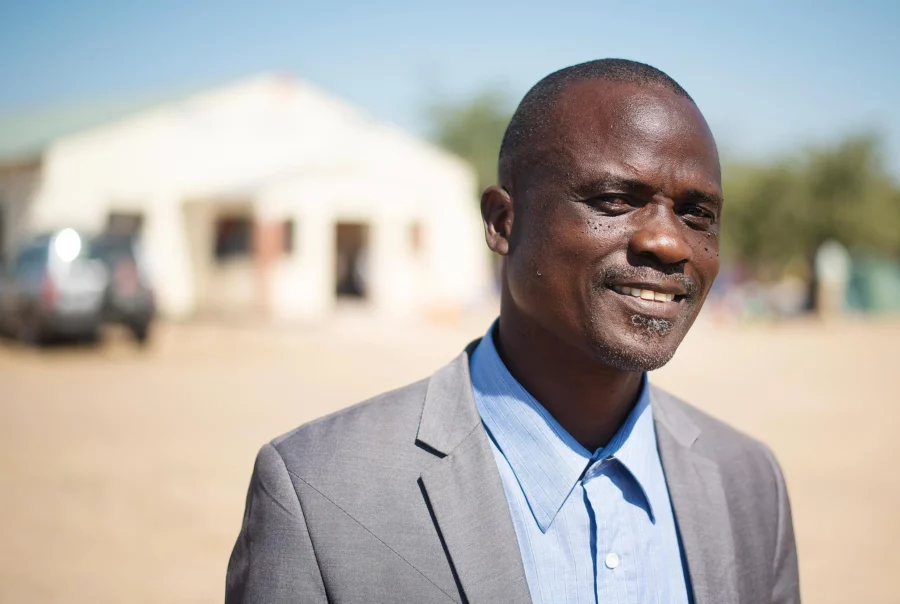In a small clearing, under the shade of a canopy of logs, a man was sleeping. Flies swarmed around overturned jugs of water and some old pots with remnants of maize. His bike lay upside-down in the dirt beside him. It had no pedals and both tires were flat. I wondered how one went about repairing a bike in a place like this, or if he just drove around on flat tires.
I also wondered what this man would do when he woke from his nap to find our odd trio—two evangelists and an American visitor. I was with Albert Muleya, the national Director of Every Home for Christ Zambia, and his Gwembe-valley ministry coordinator, Patrick. Each of these men had walked countless miles through rural Zambia to reach villages like this one. They had shared Jesus’ love with thousands of individuals and families before, but I didn’t know what to expect.

Every Home’s ministry director for Zambia, Albert.
As we walked up to him, the man opened his eyes, and he warmly invited us to sit beside him in the dirt. His clothes looked well-worn, and his shoes barely holding together. He looked like he was at least 55 years old, but it was possible that hard years in the valley had aged him prematurely. He told us his name was Mec.
My friends began chatting with him in the local dialect, and I looked on, anxious to see how the conversation developed. I could imagine how this scenario might play out in my hometown, where the act of telling a stranger about Jesus can be fraught with offense, defensiveness, or dismissal. Would Mec be offended? Would he reject what we had to say?
Albert was focused but his face was full of kindness as he talked about the value of Mec’s soul. He held a booklet in his hands. As he explained how Christ’s love gives dignity to each and every person, Albert pointed to words in the booklet. He looked confident, and his tone was that of someone who regularly shares this message.
Mec listened attentively. Within a few moments, I could see tears rolling down his face.
I interrupted Albert and asked him what was happening. Albert turned around, looking at me with a smile. “He wants to know Jesus,” he said. Mec wanted to know the value of his soul. I was caught off guard. There were no arguments made. The conversation lasted, at most, ten minutes, and already this man was praying to Jesus with tears.
“...Mec wanted to know Jesus. He wanted to know the value of his soul.”
The Gwembe valley is a place truly stripped of dignity and marginalized. It is home to the Tonga people (meaning “people of the river”), who were forced to leave their historic homeland on the fertile banks of the Zambezei river by the English and Zambian governments’ project to damn the river for hydro power in the 1950’s. The Tonga now inhabit the dry Gwembe valley, where their way of life transformed into a struggle for survival. Albert describes the painful history of the Tonga people in stark terms, “they are a buried people.”
As Mec committed his life to Jesus the whole place felt sacred—the dirt, the bike, Mec’s tears. In this place there was tangibly good news, from one person to another, and a soul ready to receive hope. The mystery of faith suddenly seemed simple. I cannot explain it, but I could see Christ in Mec’s eyes.
Before we said goodbye, Albert directed Mec to visit a regular gathering of Christ-followers close by where Mec could meet with people from his village and learn more about the hope he had found. As we walked away, I asked Albert if what had just happened was normal.
He said, “These people have no hope. They are waiting for news that will give them value—”
But we were interrupted: there wasn’t even time to explain what was happening. As Albert spoke, a young mother asked if we would come to her home next. We would sit in the dirt with many others that afternoon. Albert and Patrick looked into the eyes of old women, children, mothers, and anyone who wanted to hear about the dignity of their souls in Christ. Without fail, tears would come. Then a prayer. It seemed so easy—and it was.
In the Gwembe Valley, the gospel is desperately needed. When it arrives, people stop in their tracks to receive it. In Mec’s tearful response to Jesus’ love, I was a witness to the fact that the Gospel is still good news.
